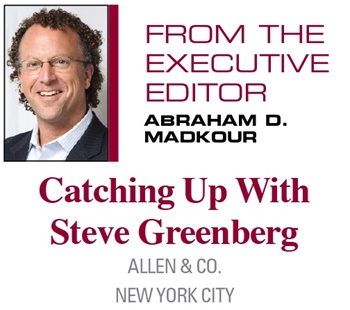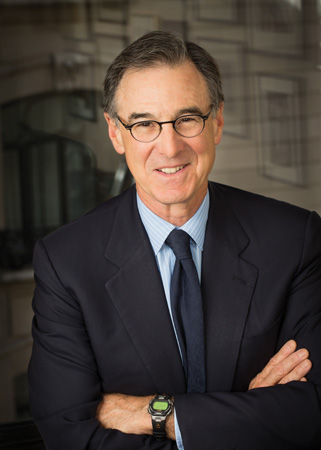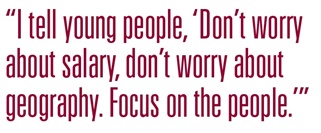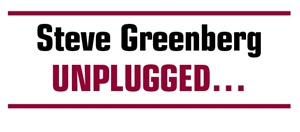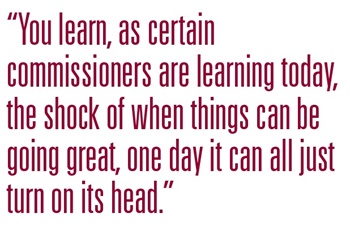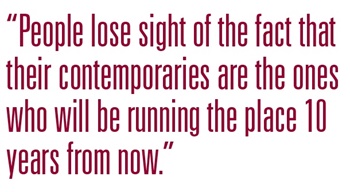Steve Greenberg relishes routine.
“I don’t like change,” he tells me over chopped salad and sandwiches at Allen & Co.’s 5th Avenue boardroom. “I’ve been married for 44 years. I’ve lived in the same apartment since we’ve moved to New York. I eat at the same restaurant four nights a week. I see no reason to look for something new when you have something you like.”
Greenberg’s clearly doing something he likes, and is very good at. Since 2002, he has led Allen & Co.’s widely respected sports and media practice. With relationships at the highest levels of sports, finance and media, he’s one of the industry’s top dealmakers and someone everyone in the business wants to know.
While Greenberg may not like change, his career has been marked by significant shifts — from player, to agent, to entrepreneur — but he says none of it was planned. “My career was built on luck. There was no premeditation involved,” he says over lunch. But each step he took along the way prepared him for his next experience, and he said that’s what counts.
‘I got the joke about three years into Triple A’
A young Greenberg thought he’d follow the path of his Baseball Hall of Fame father, Hank Greenberg, who played in Major League Baseball until 1947. Drafted by the Washington Senators, Steve graduated from Yale in 1970, where he played first base and was team captain.
“I thought I would have a 10-, 12-, 15-year major league career,” he says with a smile. “I had no illusions about being my dad. But I really thought I’d play until I was in my 30s, and then figure out what to do. But I got the joke about three years into Triple A.” At 26, his wife pregnant with their first child, he applied to law and business school. “My wife, Myrna, said I should go to law school, that I’d find law more interesting.”
He attended UCLA law school and loved it.
“Law school teaches you a different way of thinking,” he says. “The intellectual process suited me because I like to deliberate. In negotiating deals, I always try to see what the other’s point of view is and what are they trying to accomplish. Successful deal-making is not about crushing the other side, but litigation strategy.”
He finished law school in 1977, just after baseball players won the right to free agency, and he immediately received calls from his former teammates, looking for an agent. “That’s how I got into it. I built up a practice and hired Arn Tellem. We had a great run as agents.”
But he knew he needed more professionally. “I loved the guys. I grew up around ball players. But from a business standpoint, I didn’t find it intellectually challenging. It was a lot of the same stuff over and over. I’d have the same conversations with 22-year-olds about why he should hire me and how he should manage his money. I outgrew it.”
Greenberg wanted to stay close to baseball. He had kept in touch over the years with MLB Commissioner Bart Giamatti, one of his professors at Yale. When Giamatti died in 1989, Deputy Commissioner Fay Vincent become commissioner and sought out his predecessor’s student.
Pushing aside his salad, Greenberg tilts his head back and remembers, “One of the eerie things in my life is Bart died suddenly on Sept. 1, 1989. I got a letter from Bart days after he died. It was a note thanking me for something, and the last line was, ‘Do you want to come to New York? I kid not.’ I had no idea what that meant. Fay called me and said, ‘We were talking about finding a role for you here.’ I’ll remember the timing of that for the rest of my life.”
It was an easy decision for Greenberg, and he packed up his family in Los Angeles, moved east, and joined MLB as the league’s deputy commissioner in 1990, at the age of 42. It wasn’t long before he was in the middle of MLB’s fractious relationship with its players.
“The month I got there, the owners locked the players out in the winter of the 1990 season,” he recalls. “Fay’s theory was that because I had a relationship with Don Fehr, which I did from being an agent, I would have had some credibility. That lockout was settled with Don and me alone in a room. That’s how I started.”
As deputy commissioner, he learned the art of partnership and the perils of leadership.
“Fay and I were partners in every sense of the word. He included me on every single issue. I learned so much from Fay about business and about thinking through issues clearly and being prepared. When you talk about mentors, Fay is up at the top of the list.”
He also learned how quickly life can change in the executive office.
“You learn, as certain commissioners are learning today, the shock of when things can be going great, one day it can all just turn on its head.”
He points to the issue over then-Yankees owner George Steinbrenner’s relationship with gambler Howard Spira, whom he paid to find sordid information that he could use against his player, Dave Winfield, with whom he was mired in a contract dispute. That relationship with Spira led to Steinbrenner’s temporary banishment from MLB.
Sports today: ”Years ago, when Warner Bros. owned a stake in the Pittsburgh Pirates, an executive came to pick my brain. At one point, he said, ‘I assume it’s like the record business? If your big star, who is selling all the records, is on drugs, you buy them for him. But if he cools off, you fire him.’ He was only half-kidding. I thought to myself, ‘Man, what’s wrong with this picture?’
Leagues, teams and players have to know that there is a code of conduct that you are going to be held to. You don’t have to be a role model or out there every day in the community. But you do have different standards than the rest of the world because you are a public figure. If you violate that trust, they’re going to be really tough on you, even if it means some of your top performers are out of the game for some time. My barometer is the late-night shows, so when the monologues are focused about player behavior, that permeates society. The impression that athletes are doing bad things on a regular basis, and worse, getting away with it, does become a threat to the game.”
RSN business: “The trend toward team-owned RSNs has, for the most part, run its course. There is a case to be made for the hybrid model where the team locks into a long-term deal and takes a piece of ownership. That’s a good model, because if you’re a little bit off on your rights fees and the network ends up being more profitable because the affiliate fees went up, your ownership piece makes you good. There’s much less risk than launching your own network.”
Resolving the Time Warner dispute in Los Angeles: “Comcast closes its deal with Time Warner and writes down the rates. I don’t think it gets resolved absent of a reduction in the rate. You’re going to have to lower the price. The team’s not losing revenue.”
Growth sport: “The next 10 to 20 years is going to be a very, very strong period for the NBA. It’s got a huge interest worldwide. The game has got great personalities. The NBA is really poised for a great run.”
His workout: “I work out every day. I ride the bike. I do a lot of yoga; I’ve got back issues. I love golf. I took up golf when I couldn’t play tennis anymore. As long as my back holds up, I’ll be hitting the golf ball.”
Outside of the office: “I love movies, musicals and comedies. I don’t want to be depressed when I walk out of the theater. I’m stuck in the ’70s when it comes to music: Eagles, Beatles. I listen to a lot of the same things over and over again. My wife says I listen to the same thing over and over — Joni Mitchell.”
“I remember the day we saw the New York Daily News front-page piece with a check to Howard Spira. We didn’t know who Howard Spira was,” he remembers. “Things come up suddenly and your world can be turned upside down.”
Greenberg also foresaw a pending labor war turning baseball upside down, which expedited his departure from the league in 1993, a year before the 1994 strike.
“Ownership was gearing up for a fight,” he says. “There was a sense that the system had to change and the only way to make it change was through a major confrontation. It was a big part of why Fay was pushed out. The owners were correct, I believe, that Fay Vincent would not have permitted the World Series to be canceled. He would’ve used his powers to keep the games going. So if you’re gearing up for a work stoppage, you don’t want the guy out in front leading the charge to jump in your way. In that sense, they were smart in getting rid of Fay if that was their strategy. Whether it was the right strategy is a different thing.”
A new start
Removed from MLB’s labor woes, which resulted in a canceled World Series, Greenberg moved on. He was a young 46 when he met an entrepreneur, Brian Bedol, who was pitching a concept around classic sports. The two quickly became partners on Classic Sports Network.
“I loved the concept. I knew nothing about cable or about these MSOs that made deals with these networks, let alone how this signal gets from satellite to your TV.”
Almost whimsically, Greenberg adds, “Had I not been so naïve about all of the obstacles, I probably wouldn’t have pursued it.”
But he knew sports and the concept intrigued him. “I knew the rights were available. That was the big question. The first question Herbert Allen asked me when I talked to him about supporting the concept was, ‘Are the rights available?’”
It was easily the most difficult professional venture of Greenberg’s life. When I jump to the $175 million sale of the network to ESPN in 1997, he laughs, “God, Abe. You make all of this sound so easy. Oh my God. It was so hard.”
Between sips of bottled water, he recalls the difficulties.
“The hardest part was TCI, Time Warner and Cablevision trying to crush us. They all wanted the business. ESPN could’ve absolutely crushed us. They let us slide by and then, of course, they ended up buying it at a nice price.”
Greenberg sounds exhausted when talking about getting the business off the ground. “The day we went on the air, we were in 2,500 homes. When we sold the business in ’97, we were only in 6 million homes.”
But it was a business media companies wanted. A report that Fox was going to buy Classic Sports led then-ESPN President Steve Bornstein to call Greenberg and Bedol.
“We gave him a number and said we won’t go back to Fox if you hit this number. He said, ‘Your number is ridiculous.’ Which it was. He countered and said, ‘I’ll do this deal if you won’t go back to Fox.’ We agreed. In the ESPN orbit, they could drive distribution. Suddenly, Classic was in 60 to 70 million homes. That’s where it belonged from the start.”
Greenberg left with a new appreciation of the entrepreneur. “Someone said once that the exhilarating part of being an entrepreneur is that you’ll experience the highest highs and the lowest lows of your life, and often in the same day. It’s absolutely true. I wouldn’t trade it for anything. I just wouldn’t do it again.”
He joined Bedol again on the formation of CSTV, but this time he purposely served as chairman and stayed “out of the trenches working 16 hours a day.”
‘A perfect spot’
Greenberg’s been at Allen & Co. for 15 years, handling a high-profile, high-value mix of team and media deals. A well-respected dealmaker, he’s in a role that suits him.
“I like the little sphere I’m in. I like sports. I like the people in sports. I care about the intersection of sports and media. It’s a perfect spot,” he says.
It’s also an active space, fueled by the demand for sports content, leading to record franchise and media rights deals.
“There’s been a fabulous amount of wealth created in the last decade,” he says. “Many of those people are sports fans and have kids that are fans. If they’re good custodians for the team, the community and the league, that’s a good thing. A flattening out will occur when people feel a 20 or 30 percent decrease in their net worth. Not a crash, but the inevitable market downward cycle that you have to have with this kind of run up. Then there’ll be fewer bidders.”
The marketplace also has served up a different type of owner, and Greenberg cites Cleveland Cavaliers owner Dan Gilbert as a poster child for a new generation.
“He’s a different personality, has a different look, a technology guy. Entrepreneur. Risk-taker. Outspoken and focused on winning. We’re going to see more and more tech people owning teams because they’ve done well and it’s part of their personality. But you’re also going to see, whether it’s Terry Pegula in Buffalo or Dan in Detroit, really community-minded people. People using their sports ownership to grow, build and support the community — which is a really terrific, healthy thing.”
Is there any downside to this new era of owner?
He thinks, before warning commissioners, “It’s going to be harder to govern. The new breed of owner is not as unquestioning as ownership was in the past. It’s going to require very skillful and prepared commissioners.”
At 66 years old and nearly 40 years in sports, Greenberg advises young people to get the necessary business experience so they are positioned for their next significant career move.
“Work your tail off. Learn as much as you can. Be as prepared as you can. You don’t know when the next door will open, but it will. You have to make sure you’re prepared when it does and that you have the gumption to go for it. My moment was getting a call to be deputy commissioner. I realized that everything I had done, from being around baseball, to my legal career, to representing players, had prepared me for that moment. Then, the work I put in with baseball prepared me for Classic Sports.”
But he also warns that it doesn’t come easy.
“Young people have a sense they’re going to strike it rich by the time they’re 25 or 30,” he said. “You really have to work hard and work hard for a long period of time. But if you do that, and you prepare yourself, then when your opportunity comes, you can go for it.”
He does notice a dramatic difference in the social makeup of today’s executive compared with his generation.
“I got married to Myrna the week I graduated from college. That was common. Now, young people are dedicated to their careers for the first 15 years out of college. A family doesn’t seem to enter into their thinking. I can’t imagine what my life would’ve been like if I had been a bachelor for 15 years and didn’t have my daughters, Jennifer and Melanie. It certainly wouldn’t have been as fulfilling as it has been. That’s the biggest change.
“In the office, young people work really, really hard — harder than ever. There’s just no place for them to go in the social sense. I’m not sure they’re as well-rounded. They’re much more focused on career as opposed to a broader focus.”
Greenberg stresses relationship-building to young people, a skill he honed throughout his career and evident by the high level of executives who seek his counsel.
“Build relationships that pay off down the road with your peers in different organizations in the industry. If you come up together, that’s going to serve you well,” he advises. “Gary Bettman was a contemporary; he was in the same position at the NBA when I came to MLB. We developed a relationship. I did the same thing with Don Fehr. People lose sight of the fact that their contemporaries are the ones who will be running the place 10 years from now.”
I asked Greenberg, unfailingly polite and gracious, how his “niceness” sticks in the back-biting world of business.
“I see people who harbor resentments and carry around a lot of negativity toward others. That’s a lot of wasted energy,” he says. “I let it go. There are people who aren’t my closest friends, and that’s fine. But I don’t spend a lot of time thinking about how I can get even with that SOB. It’s a waste of time. I’m not looking for the next fight.”
With our lunch over, the creature of habit is looking forward to getting back to his office to work on deals. It’s what he’s very good at and what makes him happy.
“I work at my own pace, which is fairly rigorous. But I spend my summers in Jackson Hole, Wyo. There aren’t too many places that would tolerate that. So there’s really nothing that I don’t like about working here.
“It starts with people. I tell young people, ‘Don’t worry about salary, don’t worry about geography. Focus on the people. Are you working with people that you trust, that you like, that you can learn from every day, and, most importantly, that have your back when things get tough?’ That’s what you should be surrounding yourself with. That’s what I have.”
It’s the reason he doesn’t look for something new — he already has something he likes very much.
Greenberg walks me out. I predict he’ll go to his customary Vico for dinner and go home and catch some sports on TV that evening. He laughs and shakes his head. “If I watched sports when I got home, I wouldn’t be married 44 years. Some things have to give.”
Spoken like someone comfortable in his routine.
Abraham D. Madkour can be reached at amadkour@sportsbusinessjournal.com.


